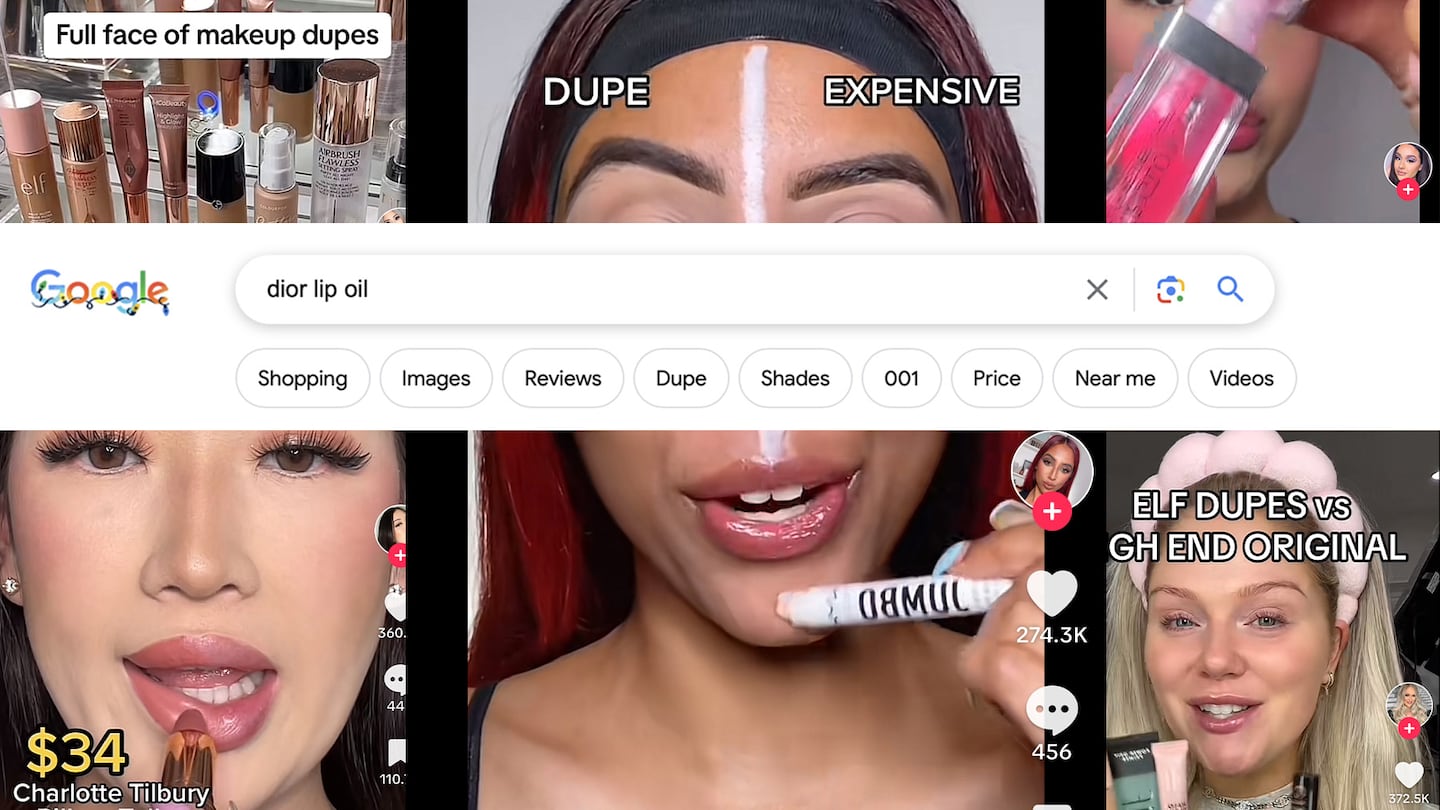
The Business of Fashion
Agenda-setting intelligence, analysis and advice for the global fashion community.

Agenda-setting intelligence, analysis and advice for the global fashion community.

A Google search for Dior’s Lip Oil — one of TikTok’s most talked-about beauty products — will bring more than just a link to the product itself.
Users who search for Dior’s Lip Oil, Charlotte Tilbury’s Hollywood Contour Wand, or a number of viral favourite beauty products, will find keywords, which look like buttons below the search bar, such as ‘dupes’ alongside the typical ‘videos,’ or ‘near me.’
TikTok may have birthed the ‘dupe’ craze, but that interest is migrating to other platforms. According to Google, the use of “dupe” on its results pages is user-led. A spokesperson for the company said the keywords and filters are determined using aggregated data and analysis of how people search for content across the web. Additionally, the suggested search terms appear in the order that Google’s systems automatically determine is most helpful for a user’s specific query.
The feature is part of an update Google introduced to its search function last year to include keywords based on related topics that help users narrow their searches. The tech giant had expected a search for vegetarian meals to bring up keywords like ‘healthy’ or ‘quick.’ As dupes become more a part of the conversation around fashion and beauty, they’ve begun appearing on Google search results, too.
ADVERTISEMENT
While offering ‘dupe’ as a keyword indicates the popularity of the search term, Jeff Trexler, a civil litigation attorney, argues that it could open a door for brands to label themselves as cheaper alternatives of other brands in order to game the system and appear high on users’ search results. Google maintains that it has a strict policy prohibiting the sale or promotion for sale of counterfeit goods as well as “a policy under which [it] will remove web pages selling counterfeit goods from search results,” a spokesperson for the company said in an email to The Business of Beauty.
“Brands who use ‘dupe’ in their descriptor can argue that they aren’t infringing on their competitor’s trademark because the term ‘dupe’ suggests a qualitative comparison and shouldn’t confuse shoppers,” said Trexler. “However, using any brand’s name or trademark in meta tags carries an element of risk.”
Google’s inclusion of ‘dupes’ on its results pages is just the latest signal of how hungry consumers are for affordably-priced alternatives to more expensive products. A tough economic landscape and a rapid trend cycle is encouraging consumers to trade down and search for affordable items, even in beauty, a category that has historically been resilient in times of lowered consumer spending. Advances in technology are making this possible.
Ceara Schreibstein, 22, a California-based sports marketer, uses Google Lens, an image-recognition software by the tech giant, to search for alternatives for high-end fashion and beauty products.
“At this stage in my life post-college I’m trying to save money,” she said. “If [a product] is over $30, I know there has to be something cheaper whether it’s a dupe or it’s on Depop.”
With Google Lens, Schreibstein searches for cheap replicas of high-end products by uploading an image of a luxury product in the search engine, which then yields a number of dupes as results.
Terry Chan, co-founder of SkinSkool, a search engine that compares skin care and cosmetics by ingredients and other markers, said she’s seen more consumers use her platform to search for dupes.
But not all users are motivated by price, said Chan. When SkinSkool launched in 2019, she added, the most popular searches were for alternatives to La Mer, whose face creams are priced between $200 and $2,675. Today, users are searching for drug store staples, such as Neutrogena, as well as alternatives to prestige beauty brands like Tatcha.
“Beauty consumers are often excited about finding and shopping for the next best thing,” said Chan. “Searching for dupes sobers consumers, in a way, and helps them cut through the marketing. They inevitably become smarter shoppers who consume less.”
Copycat products have shaken up the beauty industry as young consumers eat up inexpensive alternatives hawked on TikTok.
A new breed of beauty brands is taking a page from fast fashion, winning business by offering cheap and accessible 'dupes' of it-products.

Yola Mzizi is the Editorial Apprentice at The Business of Fashion (BoF). She is based in New York and provides operational support to the New York team and writes features for BoF and The Business of Beauty.
How not to look tired? Make money.
In a rare video this week, the mega-singer responded to sceptics and gave the public a look at what her beauty founder personality might be.
Request your invitation to attend our annual gathering for leaders shaping the global beauty and wellness industry.
Excitement for its IPO is building, but in order to realise its ambitions, more acquisitions and operational expenses might be required.